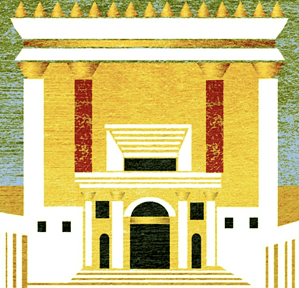
The saddest day in the Jewish Calendar Learn about Tisha B'av
Tisha B'Av, the ninth day of the Hebrew month of Av, is regarded as the saddest day in the Jewish calendar. It is a day of mourning and fasting, commemorating a series of catastrophic events in Jewish history.
Historical Significance
- Destruction of the Temples: Tisha B'Av primarily commemorates the destruction of the First Temple by the Babylonians in 586 BCE and the Second Temple by the Romans in 70 CE. These events are pivotal in Jewish history, marking the loss of Jewish sovereignty and the beginning of long periods of exile and persecution.
- The Israelites' Hesitation: According to the Torah, the Israelites’ 40 years of wandering in the desert began on this day when they hesitated to enter the Promised Land.
- Other Tragedies:
- The Bar Kochba Revolt: The failed revolt against the Romans in 132-135 CE resulted in massive casualties and the destruction of the Jewish state.
- The Plowing of the Temple Mount: After the Bar Kochba revolt, the Romans plowed over the site of the Temple, signifying a complete devastation.
- Expulsions: On Tisha B'Av, Jews were expelled from England in 1290 and from Spain in 1492, adding to the historical sorrows associated with this date.
Observances and Customs
- Fasting: Tisha B'Av is a major fast day, lasting from sunset to nightfall the following day. The fast commemorates the profound losses and sufferings in Jewish history.
- Mourning Practices: During Tisha B'Av, Jews refrain from various activities associated with comfort and joy, such as:
- Refraining from Eating and Drinking: Complete abstention from food and water for the duration of the fast.
- Not Wearing Leather Shoes: Avoiding leather footwear as a sign of mourning.
- Avoiding Bathing and Anointing: Refraining from bathing and using lotions or perfumes.
- Refraining from Marital Relations: Abstaining from intimate relations to maintain the somber mood.
- Reading Lamentations: The Book of Lamentations (Eicha), which mourns the destruction of Jerusalem, is read in a melancholic chant in synagogues.
- Reciting Kinot: Kinot, a series of dirges and lamentations, are recited to express sorrow over the many tragedies that have befallen the Jewish people.
Symbolism and Themes
- Remembrance and Mourning: Tisha B'Av serves as a collective day of remembrance, focusing on the destruction and suffering that have marked Jewish history.
- Hope and Redemption: Despite the somber nature of the day, Tisha B'Av also holds a message of hope. Jewish tradition teaches that the Messiah will be born on Tisha B'Av, symbolizing the potential for redemption and rebuilding.
Tisha B'Av is a profoundly solemn day in the Jewish calendar, marked by fasting, mourning, and reflection on the numerous tragedies in Jewish history. It is a day to remember the past, mourn the losses, and seek hope for future redemption and rebuilding.
